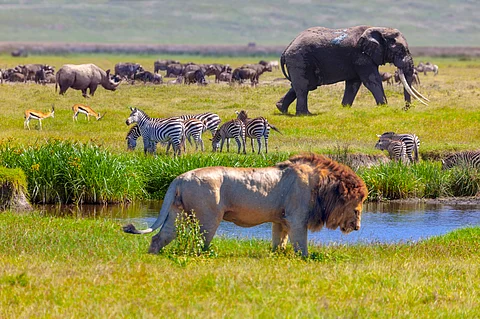

A 25-year study has uncovered that the majority of global conservation funding is directed towards larger, more 'charismatic' species, leaving critically important animals and plants significantly underfunded.
The research revealed that out of the $1.963 billion allocated to conservation initiatives worldwide, 82.9 per cent was dedicated to vertebrates. Plants and invertebrates each received just 6.6 per cent of the funding, while fungi and algae were almost entirely overlooked, securing less than 0.2 per cent.
Conducted by Guénard and a team at the University of Hong Kong, the study examined 14,566 conservation projects carried out between 1992 and 2016. It found stark disparities even within vertebrate groups, with 85 per cent of resources going to birds and mammals, while amphibians received a mere 2.8 per cent of the funding.
The bias was particularly pronounced among large-bodied mammals, such as elephants and rhinoceroses. Despite representing only a third of their group, these species were the focus of 84 per cent of conservation projects and received 86 per cent of the funding. In contrast, smaller mammals like rodents, bats, kangaroos, and wallabies remained severely underfunded, despite being classified as endangered.
Benoit Guénard, the study’s lead author, stated, “Nearly 94 per cent of species identified as threatened and at direct risk of extinction received no support. Protecting these neglected groups, which play vital roles in ecosystems and represent unique evolutionary strategies, is essential if we are to preserve biodiversity.”
Alice Hughes, a coordinating lead author of the research, added, “Our understanding of what is threatened is often narrow, leading to a situation where a handful of large mammal species receive more funding than nearly 12,000 reptile species combined. This not only hampers conservation efforts but also limits research opportunities. Many scientists are forced to switch their focus to more fundable species, creating a vicious cycle where underfunded groups, like freshwater snails, face the highest extinction rates but have the least up-to-date assessments.”
The study compared funding per species against their status on the International Union for Conservation of Nature’s (IUCN) Red List of Threatened Species, which evaluates extinction risks.
Bayden Russell, another author of the research, warned, “We are facing a global extinction crisis, with the number of threatened species rising at an unprecedented rate across diverse groups and regions. We must rethink how conservation funding is allocated. The public needs to understand the value of biodiversity and the importance of protecting all threatened species, not just those we find appealing.”
The findings revealed a funding imbalance even greater than previously thought, with the bias against invertebrates potentially 40 per cent higher than earlier estimates. Additionally, 57 per cent of all projects and 53 per cent of funding were directed towards protecting single species, rather than addressing broader ecosystems or multiple species.
Guénard emphasised the need for change: “Governments, particularly those providing the bulk of conservation funding, must adopt a more rigorous, science-based approach. Greater global collaboration to study and protect species-rich groups, as well as improved transparency in conservation investments, is urgently needed.”
The study underscores the urgent need to address funding biases to ensure the survival of all species, not just the most charismatic ones.